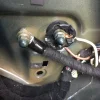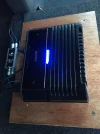Captain Jack Sparrow
Anti-cryptominer
- Joined
- Jul 1, 2007
- Messages
- 561
- Reaction score
- 118
I'm pushing the AV boundries here, but please bear with me.
Are there any audio/electric experts here? It's a very peculiar and strange problem that I can't get my head around.
In my car, I fitted a subwoofer and an associated high power subwoofer amplifier. This worked great, until I realized there were several problems:
So I installed an RCA ground loop isolator which fixed both of these problems. But it caused a new problem!
The amplifier now intermittantly drops the audio signal. I checked that the amp is always powered, not overheating or going into protect mode
Fiddling with the amplifier's RCA terminals temporarily fixes it, at least until the next pothole or speedbump.
When I remove the ground loop isolator and connect the RCAs directly, this issue does not occur, even when subjected to the above environmental vibrations.
I have an identical ground loop isolator, which is part of our Home Cinema system, so I swapped them over. This didn't solve the problem.
Taking drastic measures, I opened the amplifier and tried reflowing the solder joints for the RCA terminals, but this also didn't solve the problem.
Is this likely to be a bad grounding issue, or is the amplifier failing internally?
The amplifier's 12V positive feed was confirmed by Halfords to be good. They did not seem to bother checking the ground point, which is using one of the rear seatbelt bolts. Of course, when they examined it, this problem didn't occur and they said I had "done a good job". But I'm not confident with my own work. I'm leaning towards me installing the amp wrong, possibly with insufficient grounding.
Any ideas?
Are there any audio/electric experts here? It's a very peculiar and strange problem that I can't get my head around.
In my car, I fitted a subwoofer and an associated high power subwoofer amplifier. This worked great, until I realized there were several problems:
- Deep alternator hum (similar to mains 60Hz hum, changes with engine RPM)
- An ultra loud THUMP when the amp turns on/off.
So I installed an RCA ground loop isolator which fixed both of these problems. But it caused a new problem!
The amplifier now intermittantly drops the audio signal. I checked that the amp is always powered, not overheating or going into protect mode
Fiddling with the amplifier's RCA terminals temporarily fixes it, at least until the next pothole or speedbump.
When I remove the ground loop isolator and connect the RCAs directly, this issue does not occur, even when subjected to the above environmental vibrations.
I have an identical ground loop isolator, which is part of our Home Cinema system, so I swapped them over. This didn't solve the problem.
Taking drastic measures, I opened the amplifier and tried reflowing the solder joints for the RCA terminals, but this also didn't solve the problem.
Is this likely to be a bad grounding issue, or is the amplifier failing internally?
The amplifier's 12V positive feed was confirmed by Halfords to be good. They did not seem to bother checking the ground point, which is using one of the rear seatbelt bolts. Of course, when they examined it, this problem didn't occur and they said I had "done a good job". But I'm not confident with my own work. I'm leaning towards me installing the amp wrong, possibly with insufficient grounding.
Any ideas?

 .
.
 Although I couldn't get the fuse to fail, I was not comfortable with this, as it would theoretically fail if the amp pulled its maximum power. Engine bay fuses in my vehicle are non-standard, so I had to get a 60A fuse strip from VW, which was an absolute rip-off.
Although I couldn't get the fuse to fail, I was not comfortable with this, as it would theoretically fail if the amp pulled its maximum power. Engine bay fuses in my vehicle are non-standard, so I had to get a 60A fuse strip from VW, which was an absolute rip-off.


